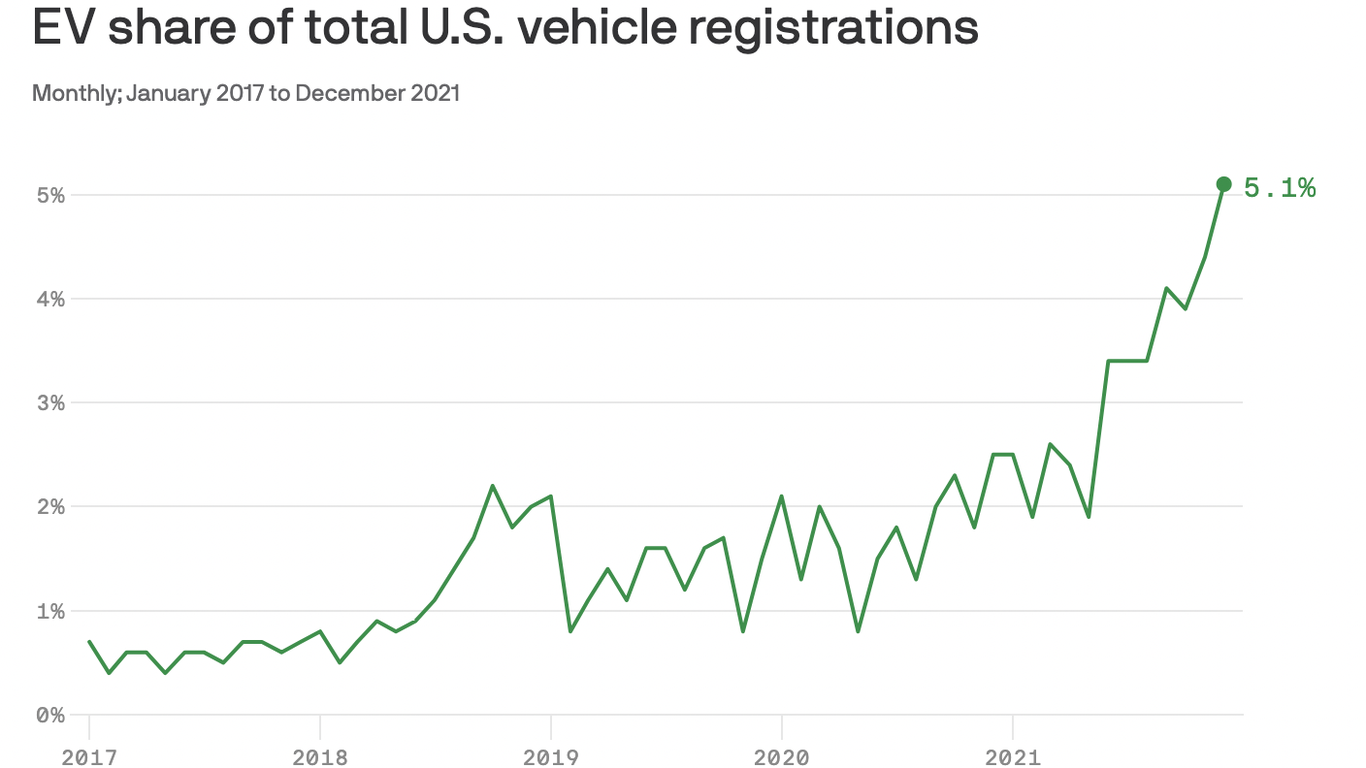
Tesla's grip on the growing U.S. electric vehicle (EV) market remains strong despite an onslaught of new plug-in models from competitors.
Why it matters: The Elon Musk-led automaker pioneered the EV movement more than a decade ago, but only now is U.S. demand starting to take off.
- EV registrations have doubled over the past year, to about 5% of all new cars, and shoppers have dozens of new choices, with many more on the way.
What's happening: The historic shift away from gasoline will take years to play out, but Axios is tracking the revolution as it rolls across the U.S., using monthly vehicle registration data from S&P Global Mobility.
- California has by far the largest market today, but EV adoption is also growing in some large cities in the Northeast, Florida and Texas. EV ownership remains limited in the Midwest.
- Each of our Axios Local newsletters will monitor EV adoption in their hometown, and take note of the most popular models among their neighbors.
- Over time, we'll be able to track the EV wave as it spreads across the country, and we'll be watching to see whether Tesla's market share declines as expected as more EVs hit the market.
Where it stands: So far, Tesla's dominance is secure.
- Teslas accounted for 61% of all EVs registered in the U.S. in April, the latest month for which data is available.
- The next closest were Ford (8%), Hyundai (6%) and Kia (6%).
- Even Ford's much-heralded F-150 Lightning and Mustang Mach-E aren't making a dent. One reason: production is limited and the automaker stopped taking orders.
- Tesla Model Y registrations (14,152) were four times that of Ford's Mach-E (3,287) in April.
The risk for Tesla is that it's trying to fight off challengers with just two vehicles: the Model 3 and Model Y.
- Sales of its older Model S and X have pretty much plateaued, and its Cybertruck has been delayed multiple times.
- Meanwhile, other companies, like General Motors, are coming with a barrage of EVs in virtually every segment, including pickup trucks, SUVs, crossovers and luxury models.
Yes, but: Tesla has a "halo around the brand that is extraordinary and unique," says Tom Libby, S&P Global Mobility analyst.
Besides, rival models "are just not setting the world on fire," Libby says.
- General Motors' newest models, like the Cadillac Lyriq and Hummer EV pickup, are in limited supply. Its EVs won't land in big numbers for another year or two.
- Volkswagen's I.D.4 hasn't made much of a splash, either. But the I.D. Buzz, a modern interpretation of the VW bus, is coming in 2024.
- Challengers like Rivian, meanwhile, have run into manufacturing bottlenecks due to chip shortages and supply chain disruptions.
- Notable launches are coming soon from Honda, Jeep, BMW and others.
- "It will depend a huge amount on the specifics of the product, including the price and the monthly payment," Libby tells Axios. "If GM is able to launch a (Chevrolet) Equinox for under $30,000, that would be competitive."
What to watch: EVs' share of North American vehicles is accelerating and could hit 28% by 2028, and 59% by 2035, per consulting firm AlixPartners.
Editor's note: This story has been corrected to reflect that the I.D. Buzz is coming in 2024, not next year.
Read Again https://www.axios.com/2022/06/27/tesla-electric-vehicle-ev-salesBagikan Berita Ini
















0 Response to "Tesla's in the lead as US electric car sales get supercharged - Axios"
Post a Comment